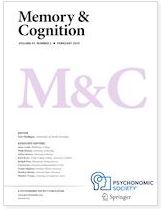A Paper by Dr. Ueda et al. was Published in Memory & Cognition
A research paper by Senior Lecturer Yoshiyuki Ueda, Prof. Satoru Saito (Education, Kyoto University) and Ms. Momoe Sukegawa (Education, Bio studies, Kyoto University) was published in Memory & Cognition. Memory is enhanced when the same information is repeatedly presented. The research finding shows the possibility that the mechanism is different depending if it is visual information or auditory information.

Sukegawa, M., Ueda, Y., & Saito, S.* (2019).
The effects of Hebb repetition learning and temporal grouping in immediate serial recall of spatial location.
Memory & Cognition.
https://doi.org/10.3758/s13421-019-00921-9
https://rdcu.be/bstYS
○Abstract
The Hebb repetition effect is a phenomenon in which a repeated presentation of the same list increases the performance in immediate serial recall. This provided the theoretical basis for a core assumption of the Atkinson and Shiffrin model regarding information transfer from short-term memory to long-term memory. The Hebb repetition effect was originally reported for the verbal domain, but subsequent studies found similar phenomena using visuospatial paradigms, for example, in serial-order memory for dot locations. The present study examined in two experiments the effects of presentation timing of nine spatial locations on Hebb repetition learning. In Experiment 1, the Hebb repetition effects were observed for spatial locations with constant timing presentation as well as temporal grouping presentation. In the latter condition, all lists were presented with the same temporal structure, that is, temporal pauses were inserted after the third and sixth serial positions. This manipulation led to a better recall performance in comparison with the constant presentation, but did not interact with the repetition. In Experiment 2, the Hebb list was presented with a different temporal structure in every repetition in the random-grouping condition. Although this manipulation is known to eliminate or weaken the Hebb effect in the verbal domain, we observed stable repetition effects in this experiment. This suggests that there might be some domain-specific mechanisms in Hebb repetition learning. These results may facilitate the development of theories of the relationship between short-term and long-term memory.
Keywords・Hebb repetition learning ・Temporal grouping ・Visuospatial short-term memory
2019/03/27